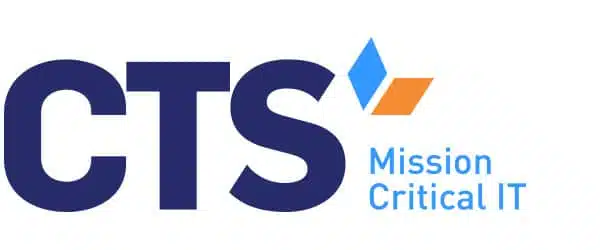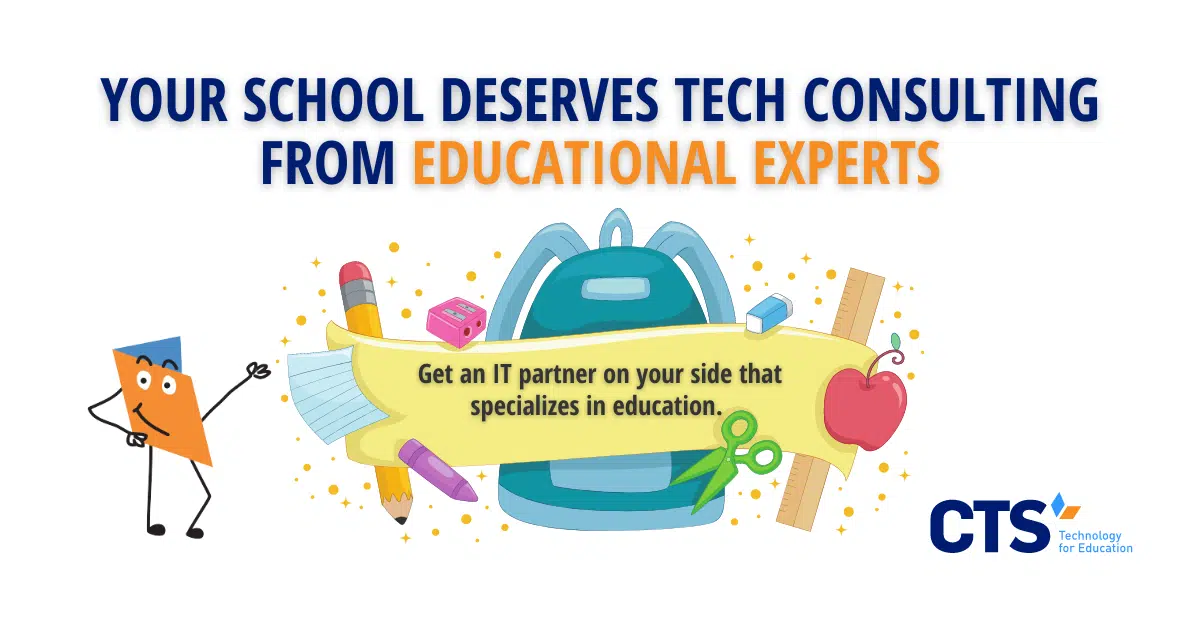School administrators juggle dozens of competing priorities across multiple domains.
From scheduling parent-teacher conferences to attending a budget meeting for the next school year, or even monitoring the hallways during classroom transitions, school leaders rarely have a moment to themselves during the school day. Managing multiple domains, from emergency readiness to food service, transportation, and instructional coaching, means administrators can’t devote all of their time to any single project or department.
With those pressures, schools turn increasingly to third-party service providers to oversee non-instructional aspects of school programming. Outsourcing the day-to-day management of specific non-instructional departments, including educational technology, allows school leaders to devote their time and energy to teachers, students, and parents, as well as instructional management, more broadly.
Embracing outsourced IT consulting, in particular, gives school leaders crucial insights into the latest trends in wireless internet service provision or best practices in student and staff device management. Bringing on consultants with domain-specific expertise in learning and instructional technology can, therefore, ultimately improve non-instructional aspects of school programming, as well as allowing administrators to spend more time in classrooms supporting teachers and students.
Technology consultants who focus on education have a broader view of the educational technology landscape.
When schools hire a technology consulting firm, they’re often in search of expertise they can’t provide in-house. Managing the federal E-rate bidding and service provision process, installing new wireless access points, and procuring hundreds of student devices are examples of tasks with which many school leaders have little experience, much less knowledge of best practices.
Technology consultants can fill the gaps in school leaders’ knowledge, bringing to bear insights into the latest technology trends, as well as experience in long-term technology planning. If a school is aiming to expand with an additional site, grade level, or simply increase enrollment, a consultative approach that bridges the gap between IT and educational vision exposes administrators to a broad range of programmatic and financial considerations, ultimately improving the educational technology experience for the school’s students and staff members.
Rather than re-purchasing hardware they’ve used in the past or renewing their existing instructional technology licenses, school leaders can lean on consultants to consider alternative options, as well as obtain guidance on how to effectively introduce new products to their school communities.
By asking the right questions, technology consultants can align educational technology decisions with schools’ unique missions.
In the process of learning more about the needs of their school clients, technology consultants can also help administrators align their technology choices with their broader organizational mission. Rather than viewing technology as ancillary to instruction, technology consultants can help school leaders better integrate student and staff devices, online instructional platforms, and other educational technology products into daily instruction.
For example, if a school already has a one-to-one student-device ratio, technology consultants can recommend a number of online instructional platforms, such as DreamBox, Illuminate, or BrainPop, that teachers could then integrate into their daily instructional practice. When it comes to longer-term planning efforts, schools can work with their consultants to make purchasing decisions based on their broader organizational roadmaps. For example, rather than spending all of their E-rate funds in a given year, school leaders might choose instead to rollover their federal dollars to the following academic year, cognizant of a planned expansion or other significant future investment.
School leaders can have a clear sense of their school’s technology vision and be unsure of how to execute it.
Once decisions about educational technology are made, a consultative approach that puts education first can also provide tremendous implementation benefits. From creating project plans for their school or central office clients to even conducting professional development sessions with staff or managing summer device check-in and redistribution, technology consultants can remove much of the administrative burden from school leaders, who can then devote more time to higher-level strategic planning efforts or other priorities.
Shifting the burden of execution to technology consultants can be particularly helpful for schools engaged in start-up efforts, whether adding a grade, expanding enrollment, or opening for the first time. Working closely with a school’s leadership team, technology consultants can evaluate floor plans to determine the feasibility of installations in specific classrooms, identify potential wireless access “dead zones,” and more generally allow school leaders to be more strategic in their facilities decision-making process. Once decisions about classroom and office assignments are made, technology consultants can often provide personnel to manage installation and early troubleshooting efforts.
Technology consultants specializing in educational environments can assist school leaders with their long-term planning efforts, shifting the focus away from the day-to-day toward a more comprehensive vision of educational technology use.
Even after a start-up period or new school year launch, technology consultants can provide significant benefits to school leaders’ long-term planning efforts, allowing them to develop a more comprehensive vision of educational technology beyond a given school year.
For example, after conducting a thorough inventory of an individual school or network’s hardware, technology consultants can generate a device replacement timeline with significant budgetary implications. After learning when and at what cost they’ll likely have to replace certain devices or other technology infrastructure, school leaders can begin to allocate their limited funds more strategically, accelerating or postponing other purchases based on their educational technology needs. Even if schools are unable to follow a proposed replacement timeline exactly, technology consultants can nonetheless propose a range of options that allow school leaders to prioritize specific purchases over others.
Rather than dictating a particular course of action, a consultative approach focused on learning outcomes can provide leaders with a set of choices that ultimately enables them to be more intentional about their financial decision-making processes.
Evaluating learner habits can inform long-term technology planning efforts.
As school leaders become more intentional about their educational technology choices, they can lean on consultants to help them use learner habits to inform future purchasing decisions. While pulling data on student usage across online instructional platforms is relatively easy in some cases, consultants can quickly produce these reports on behalf of leaders, providing them a high-level overview of student and even teacher engagement.
Analyzing this data yields two main impacts. First, it creates a dialogue between school leaders, teachers, and students. Why is usage high among a particular set of classrooms, but not others? Is there a reason a particular instructional platform is used nearly every day in the fall, but almost never the spring? What is one teacher doing to yield results that can be shared with others in the same department?
Second, it provides leadership with concrete data they can use to determine whether or not to renew a particular piece of instructional technology. While teachers may ask that a certain platform be purchased, it makes little sense to continue doing so if it won’t be used. Similarly, high usage on certain platforms can ultimately validate teacher requests, providing the basis for continued renewal and even expansion beyond the classrooms or grade levels in which the platform was originally used.
A consultative approach that fully integrates educational objectives with a comprehensive view of technology can generate these and other feedback loops between school leaders, teachers, and students that may otherwise not exist, allowing administrators to refine their decision-making processes each year.
Drawing upon experience with multiple clients, the right technology consultants can share best practices among schools, exposing school leaders to a variety of potential technology choices.
In addition to generating an internal dialogue between members of a school community, technology consultants may also be well-positioned to facilitate meetings between leadership teams of multiple schools. While the clients with whom educational technology consultants work can vary dramatically, many embrace similar hardware, software, and other instructional technology choices. Putting school teams in dialogue with one another, whether formally or informally, can provide school leaders with insights they may lack.
When selecting an educational technology consultant for their school, leadership teams should review the type of clients with whom the firm currently works. Do these schools have similar enrollments or student populations to their own? How many sites does the firm service, and what is the scope of work across the network? What are the recurring touchpoints between the client and the firm, and how do those touchpoints fit into wider coordination efforts?
The more familiar a technology consultant is with schools similar to their own, the more confident school leaders can be that the firm is able to meet the unique needs of their school community, as well as share best practices adopted from other clients.
At CTS, we work with schools across the United States to align technology choices with organizational missions.
Our teams have partnered with schools across the United States to deliver exceptional educational technology experiences to students, teachers, and leadership teams. From developing summer work scopes to evaluating E-rate purchasing decisions and planning for future expansions, CTS has the experience to help you realize your school’s unique mission.
Contact us today to learn more about our services and how we can enhance your school’s existing educational technology programming.




